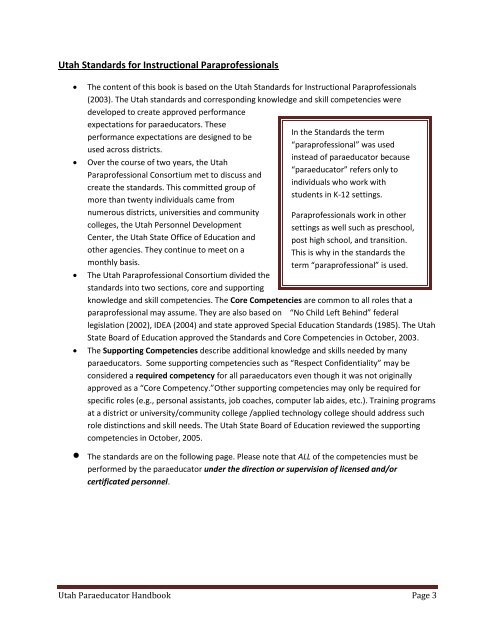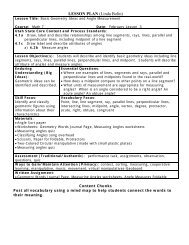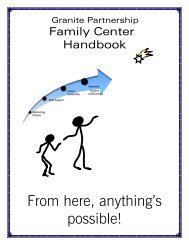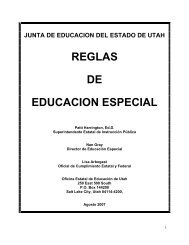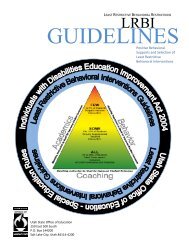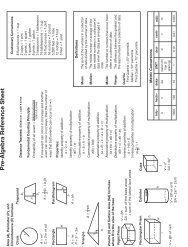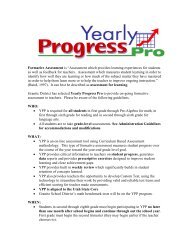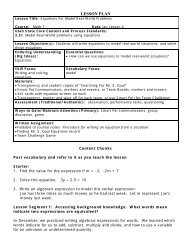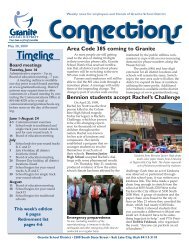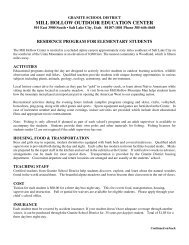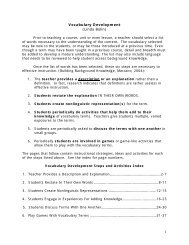Utah Special Education Paraeducator Handbook - Granite School ...
Utah Special Education Paraeducator Handbook - Granite School ...
Utah Special Education Paraeducator Handbook - Granite School ...
Create successful ePaper yourself
Turn your PDF publications into a flip-book with our unique Google optimized e-Paper software.
<strong>Utah</strong> Standards for Instructional Paraprofessionals<br />
<br />
<br />
<br />
<br />
The content of this book is based on the <strong>Utah</strong> Standards for Instructional Paraprofessionals<br />
(2003). The <strong>Utah</strong> standards and corresponding knowledge and skill competencies were<br />
developed to create approved performance<br />
expectations for paraeducators. These<br />
performance expectations are designed to be<br />
used across districts.<br />
Over the course of two years, the <strong>Utah</strong><br />
Paraprofessional Consortium met to discuss and<br />
create the standards. This committed group of<br />
more than twenty individuals came from<br />
numerous districts, universities and community<br />
colleges, the <strong>Utah</strong> Personnel Development<br />
Center, the <strong>Utah</strong> State Office of <strong>Education</strong> and<br />
other agencies. They continue to meet on a<br />
monthly basis.<br />
The <strong>Utah</strong> Paraprofessional Consortium divided the<br />
standards into two sections, core and supporting<br />
In the Standards the term<br />
“paraprofessional” was used<br />
instead of paraeducator because<br />
“paraeducator” refers only to<br />
individuals who work with<br />
students in K-12 settings.<br />
Paraprofessionals work in other<br />
settings as well such as preschool,<br />
post high school, and transition.<br />
This is why in the standards the<br />
term “paraprofessional” is used.<br />
knowledge and skill competencies. The Core Competencies are common to all roles that a<br />
paraprofessional may assume. They are also based on “No Child Left Behind” federal<br />
legislation (2002), IDEA (2004) and state approved <strong>Special</strong> <strong>Education</strong> Standards (1985). The <strong>Utah</strong><br />
State Board of <strong>Education</strong> approved the Standards and Core Competencies in October, 2003.<br />
The Supporting Competencies describe additional knowledge and skills needed by many<br />
paraeducators. Some supporting competencies such as “Respect Confidentiality” may be<br />
considered a required competency for all paraeducators even though it was not originally<br />
approved as a “Core Competency.”Other supporting competencies may only be required for<br />
specific roles (e.g., personal assistants, job coaches, computer lab aides, etc.). Training programs<br />
at a district or university/community college /applied technology college should address such<br />
role distinctions and skill needs. The <strong>Utah</strong> State Board of <strong>Education</strong> reviewed the supporting<br />
competencies in October, 2005.<br />
The standards are on the following page. Please note that ALL of the competencies must be<br />
performed by the paraeducator under the direction or supervision of licensed and/or<br />
certificated personnel.<br />
<strong>Utah</strong> <strong>Paraeducator</strong> <strong>Handbook</strong> Page 3


